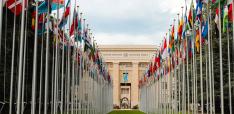Reevaluating the Caesar Syria Civilian Protection Act of 2019

Ahmad Khalil explores the implications of the Caesar Act's sanctions in a post-Assad Syria, highlighting the need to transition from punitive measures to policies fostering accountability, reconstruction, and democratic governance.
The Caesar Syria Civilian Protection Act of 2019, commonly known as the "Caesar Act," was landmark U.S. legislation targeting the Assad regime for war crimes during the Syrian civil war. Named after a Syrian military defector who exposed evidence of systematic torture and killings, the Act came into effect on June 17, 2020. It empowered the U.S. government to impose sweeping sanctions on individuals, entities, and governments supporting Syria’s military campaigns or aiding reconstruction without adhering to human rights standards. The Act was both a moral and legal response to the regime's atrocities, aiming to hold perpetrators accountable and deter foreign support.
However, the fall of Bashar al-Assad's regime raises critical questions about the Act’s legal validity and applicability. Sanctions under international law must be proportionate, objective, and tied to ongoing violations. With the regime responsible for these crimes no longer in power, the continued enforcement of the Caesar Act could be seen as misaligned with its original purpose. The Act's provisions, designed to target Assad and his enablers, are fundamentally altered by the regime's collapse, challenging their alignment with international legal principles and raising concerns about their justification in a post-Assad Syria.
Legal Grounds for Non-Applicability
The Caesar Act legislative text stipulates that an end to attacks on civilians, unhindered access to humanitarian aid, the release of political prisoners, and accountability for war crimes are the criteria for relief from these sanctions. Presumably, the collapse of the Assad regime would meet those criteria to a significant degree (1).
A new government, in particular, if it proves that it is really committed to democratic principles and the respect of human rights, cannot reasonably be subjected to sanctions that were tailor-made for abuses under the previous regime.
Additionally, the sunset clause of the Act itself, which states that it shall be valid for five years starting from its enactment, expired on December 20, 2024. While the U.S. Congress may still reauthorize or otherwise modify the Act, any attempt to utilize its provisions against a post-Assad Syria would require actual legislative adjustments to the altered geopolitical landscape.
Policy and Humanitarian Considerations
Prolonging the sanctions under the Caesar Act could worsen the struggles of ordinary Syrians as they try to rebuild their lives after years of conflict. The country is already grappling with immense challenges: shattered infrastructure, millions of displaced families, and a collapsing economy. Sanctions that restrict access to international aid and investments risk making these problems even worse, leaving communities without the support they desperately need to recover (2).
The Caesar Act was created to hold the Assad regime accountable for its crimes, but extending its sanctions to a new government that is trying to reform and rebuild could send the wrong message. It would undermine the hope for a fresh start and make it harder for the international community to partner with Syria during this critical period. Instead of supporting recovery, such sanctions could isolate Syria further and hurt efforts to restore stability in the region.
The reality of sanctions is that they don’t just impact governments; they also make life harder for humanitarian organizations trying to deliver aid. Workers on the ground often face delays because of complicated rules and restrictions, slowing down the delivery of food, medicine, and essential services. Banks, worried about unintentionally violating sanctions, frequently refuse to process transactions for Syria, leaving aid groups struggling to pay their staff, buy supplies, or even keep their operations running (3).
These delays and obstacles have real consequences for Syrians. Families may go without food, children may lose access to education, and communities may remain without clean water or healthcare. Even efforts to help people rebuild their homes or restart their livelihoods are often tangled in red tape, as organizations worry about whether their work could unintentionally violate sanctions rules (4).
The Way Forward
Any post-Assad Syria will necessitate an international community that engages it in a nuanced way. Accountability for the commission of crimes would always remain indispensable; this goal, however, may be achieved through international tribunals or transitional justice frameworks without imposing blanket economic sanctions. Absent any punitive approach, U.S. policy needs to be transitioned toward one of constructive engagement, including offering incentives toward democratic governance and adherence to basic human rights.
The Caesar Act is a product of its time—an accountability tool aimed at addressing the specific atrocities committed by the Assad regime. It lacks a legal and moral rationale in its continued application today that the regime has fallen. Policymakers must come to recognize that times have moved on and alter their policies accordingly in ways that actually support transition toward peace and stability for Syria.
Ahmad Khalil is an Assistant Professor at VIT School of Law, VIT University, Chennai, Tamil Nadu, India.
Photo by Samer Daboul
Notes
1 U.S. Department of State, Caesar Syria Civilian Protection Act, June 17, 2020, Available at: Caesar Syria Civilian Protection Act - United States Department of State.
2 Debarre, Alice. "Safeguarding humanitarian action in sanctions regimes." International Peace Institute (2019).
3 Walker, Justine. "Study on humanitarian impact of Syria—related unilateral restrictive measures." Beirut, Lebanon: UNESCWA (2016): 1-42.
4 Intersos (2022),"The impact of counterterrorism measures and sanctions on humanitarian action" https://www.intersos.org/en/sanctions-on-humanitarian-action-the-response-of-ngos-in-a-statement/


